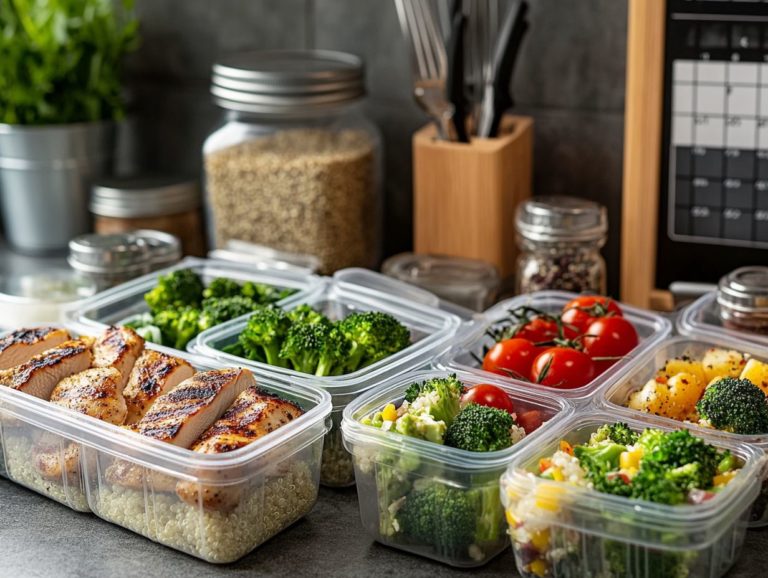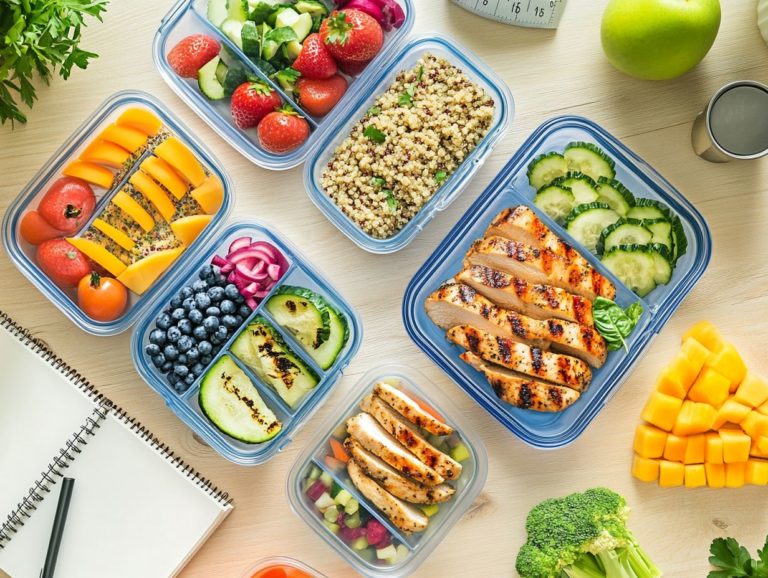How to Track Your Meal Planning Progress
Tracking your meal planning progress is crucial for anyone eager to elevate their eating habits and enhance overall health.
This exploration delves into the myriad benefits of keeping tabs on your meals. You ll uncover a variety of tools such as apps and journals that can streamline this journey, learn which key metrics to keep an eye on, and discover how to set achievable goals.
Common challenges will be tackled, paired with practical tips to keep you motivated and on track. Whether you re a seasoned planner or just embarking on this path, this guide equips you to maximize your meal planning efforts.
Contents
- Key Takeaways:
- The Importance of Tracking Meal Planning Progress
- Tools for Tracking Meal Planning
- What to Track
- Setting Goals and Tracking Progress
- Common Challenges and How to Overcome Them
- Frequently Asked Questions
- How can I track my meal planning progress?
- Why is tracking my meal planning progress important?
- What should I track when it comes to meal planning progress?
- How often should I track my meal planning progress?
- Can I track my meal planning progress while eating out?
- What are some common pitfalls to avoid when tracking meal planning progress?
Key Takeaways:

- Tracking meal planning progress is crucial for success.
- Utilize tools like apps and journals to easily track progress.
- Key metrics to track include budget, grocery list, and meal variety.
The Importance of Tracking Meal Planning Progress
Tracking your meal planning progress is essential for anyone dedicated to health and wellness. It provides clarity on your dietary choices.
This practice streamlines meal preparation and aligns your actions with your established health goals.
By incorporating nutrition apps and food logging techniques, you can gain a deeper understanding of your calorie intake and cater to your specific dietary needs. The vibrant community surrounding these tools fosters a sense of accountability, making it simpler for you to remain committed to your meal planning strategies.
Recognizing how habit formation plays a role in meal tracking can greatly improve your long-term success in achieving personal health goals.
Benefits of Keeping Track
Tracking your meals unlocks a treasure trove of benefits that can elevate your journey toward improved health and nutrition. By utilizing meal planning apps, you gain access to personalized coaching, allowing you to create dietary strategies that align perfectly with your unique health goals and preferences.
Nutritional tracking ensures you’re aware of your micronutrient intake, helping you pursue well-balanced meals. Plus, logging your meals can spark recipe inspiration, offering fresh ideas for varied meal prep and making healthy eating more enjoyable.
Integrating these features enables you to make informed food choices as you analyze your eating habits over time. This comprehensive approach fosters greater accountability and helps you make necessary adjustments, ensuring your progress stays on track.
With tools that provide variety in meals, you’re less likely to suffer from meal fatigue, making your wellness journey both engaging and sustainable. By merging nutritional insights with the creativity of diverse recipes, you can transform meal preparation into a fulfilling ritual, reinforcing your commitment to a healthier lifestyle.
Tools for Tracking Meal Planning
Utilizing the right tools for tracking your meal planning is crucial for achieving success in your health and wellness journey. Nutrition apps like MyFitnessPal, Cronometer, and Yazio come equipped with extensive databases and handy features such as barcode scanners, making food logging a breeze.
Meal planning apps like Mealime and PlateJoy elevate your experience, providing you with grocery lists and recipe logging functionalities that streamline your meal prep process. These tools not only simplify tracking but also cultivate a more organized approach to meeting your dietary preferences and restrictions.
Apps, Journals, and Other Options

If you’re looking to improve your meal planning, there are many apps and journals to choose from. These options cater to your preferences and will elevate your experience.
When selecting the right tool, consider factors like ease of use, design aesthetics, and your comfort with digital versus analog methods.
Apps often come packed with features such as nutrition analysis and meal suggestions. These can significantly streamline your planning process. Journals, on the other hand, provide a straightforward way to document your meals without the risk of screen fatigue.
Make these tracking tools part of your daily routine, and watch your meal planning improve. This integration can help you foster healthier eating habits over time, leading to greater success in achieving your dietary goals.
What to Track
Tracking your meals is essential for meeting your health goals. Focus on key metrics like calorie intake, nutritional needs, and vitamin and mineral levels to ensure balanced nutrition.
Categorizing your food choices helps illuminate your eating patterns and preferences. This can enhance your decision-making in meal preparation.
By concentrating on these vital elements, you can customize your meal planning strategy to align perfectly with your unique health objectives.
Key Metrics for Meal Planning Progress
Key metrics for tracking your meal planning progress include calorie tracking, monitoring dietary needs, and assessing micronutrient intake. This ensures a well-rounded approach to health and wellness.
Organizing food categories simplifies the assessment of your dietary patterns, ensuring all aspects of nutrition are accounted for.
By paying attention to these metrics, you can evaluate your daily intake and identify any gaps in essential nutrients that could impede your wellness journey. For example, focusing on calorie tracking helps you manage your weight effectively, while addressing tailored dietary needs accommodates any allergies or specific preferences you may have.
Understanding your micronutrient intake is vital for maintaining your energy levels and overall health. Embracing food categorization grouping fruits, vegetables, grains, and proteins enables a clearer understanding of your dietary habits.
This paves the way for informed choices and sustainable progress toward healthier living.
Setting Goals and Tracking Progress
Establishing clear health goals and diligently tracking your progress is essential for anyone dedicated to meal planning and overall wellness. By defining personalized goals, you can implement meal planning strategies that align with your dietary preferences and fitness aspirations.
Monitoring your progress solidifies behavior changes and cultivates a sense of accountability. This allows you to adjust your approach with ease.
Through regular reviews, you can assess your successes and make informed decisions to elevate your meal planning efficiency.
Creating Realistic Goals and Measuring Success

Creating realistic goals is essential for effective meal planning and long-term success in achieving your health aspirations. By assessing your dietary needs and preferences, you can set achievable targets that align with your overall wellness objectives.
Tracking your progress helps you measure success and allows you to reflect on your journey. Adjust your meal planning strategies as needed. Getting help from an expert who gives you tailored advice can enhance your experience, providing insights that support your development in healthy eating habits.
This reflective process enables you to celebrate achievements while highlighting areas for improvement, ensuring you maintain a balanced approach. By incorporating specific benchmarks, you can identify patterns in your eating habits and make informed decisions moving forward.
Personalized coaching offers tailored feedback based on your progress, making it easier to stay motivated and accountable.
The combination of realistic goal-setting, thoughtful tracking, and expert guidance creates a supportive environment where you can thrive on your journey to healthier living.
Common Challenges and How to Overcome Them
Encountering challenges during meal planning is normal, but knowing how to navigate these setbacks is essential for your sustained progress. You might struggle with changing habits, inconsistent tracking, or the fatigue that comes with meal prep all of which can impede your health goals.
By leveraging health tools and tapping into user feedback, you can gain valuable insights and strategies to tackle these obstacles. Focus on forming good habits and establishing supportive routines to cultivate strength and keep your motivation alive throughout your meal planning journey.
Dealing with Setbacks and Staying on Track
Dealing with setbacks in meal planning can feel disheartening, but stay focused on your health goals; they are worth it! Implement effective strategies to stay on track.
Staying committed often requires a bit of flexibility and adjustments, especially when unexpected challenges arise. Recognize that meals can be modified and plans can be refined without losing sight of your overall wellness. Engaging with a supportive community greatly enhances your journey; sharing experiences and solutions fosters strength and offers fresh perspectives.
This collective encouragement can reignite your motivation and spark creativity in meal preparation. Embracing a proactive mindset enables you to tackle challenges head-on while reinforcing your dedication to your long-term health aspirations.
Frequently Asked Questions
How can I track my meal planning progress?

Track your meals with a food diary, an app, or a spreadsheet. Pick what works best for you!
Why is tracking my meal planning progress important?
Tracking your meal planning progress lets you see patterns in your eating habits, identify areas for improvement, and adjust to achieve your health and nutrition goals.
What should I track when it comes to meal planning progress?
When tracking progress, record what you eat, portion sizes, nutrient breakdown, and notes on your mood or hunger levels. This gives you a comprehensive view of your eating habits.
How often should I track my meal planning progress?
Aim to track your meals daily. This helps you adjust your habits quickly!
Start tracking your meals today!
Can I track my meal planning progress while eating out?
Yes! You can track your meal planning progress even when dining out. Many restaurants share nutrition details online or on their menus.
There are also apps that help estimate the nutrients in your meal. Planning ahead can make a big difference in choosing healthier options!
What are some common pitfalls to avoid when tracking meal planning progress?
A common pitfall is being too hard on yourself. It’s important to be flexible and allow for occasional treats without guilt.
Focus on your own journey instead of comparing progress with others. Celebrate your achievements along the way!






